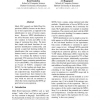Free Online Productivity Tools
i2Speak
i2Symbol
i2OCR
iTex2Img
iWeb2Print
iWeb2Shot
i2Type
iPdf2Split
iPdf2Merge
i2Bopomofo
i2Arabic
i2Style
i2Image
i2PDF
iLatex2Rtf
Sci2ools
107
click to vote
EMNLP
2009
2009
Multi-Word Expression Identification Using Sentence Surface Features
Much NLP research on Multi-Word Expressions (MWEs) focuses on the discovery of new expressions, as opposed to the identification in texts of known expressions. However, MWE identification is not trivial because many expressions allow variation in form and differ in the range of variations they allow. We show that simple rule-based baselines do not perform identification satisfactorily, and present a supervised learning method for identification that uses sentence surface features based on expressions' canonical form. To evaluate the method, we have annotated 3350 sentences from the British National Corpus, containing potential uses of 24 verbal MWEs. The method achieves an F-score of 94.86%, compared with 80.70% for the leading rule-based baseline. Our method is easily applicable to any expression type. Experiments in previous research have been limited to the compositional/non-compositional distinction, while we also test on sentences in which the words comprising the MWE appear...
EMNLP 2009 | Natural Language Processing | Rule-based Baseline | Simple Rule-based Baselines | Supervised Learning Method |
Related Content
| Added | 17 Feb 2011 |
| Updated | 17 Feb 2011 |
| Type | Journal |
| Year | 2009 |
| Where | EMNLP |
| Authors | Ram Boukobza, Ari Rappoport |
Comments (0)

